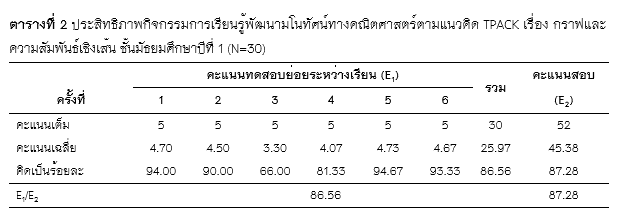The Development of Learning Activities Based on the Tpack Concept of Graphs and Linear Relationships to Enhance Mathematical Conceptual Understanding of Seventh Grade Students
Main Article Content
Abstract
The purposes of this research were: 1) to develop and determine the effectiveness of learning activities based on the TPACK concept on graph and linear relationships to reach efficiency of 75/75, 2) to study levels of the mathematical conceptual understanding on graph and linear relationships of seven grade students, and 3) to study students' satisfaction toward learning activities based on the TPACK concept. The target group consisted of 30 seventh grade students which the purposive sampling method was applied to select. The research instruments were lesson plans and learning activities based on to the TPACK concept in graph and linear relationships, the level of mathematical conceptual understanding’s test, and the satisfaction questionnaire. The data were analyzed by using percentages, mean, and standard deviations.
The research findings were as follows: 1) The effectiveness of the developed learning activities based on the TPACK concept of graph and linear relationships was 86.56/87.28 which was higher than the 75/75 criteria. 2) After studying with learning activities developed based on the TPACK concept of graphs and linear relationships. Students' math comprehension scores are at the highest action (A) level, followed by process (P) and learning (O), respectively, and 3) The student’s level of satisfaction toward the learning activities based on the TPACK concept in graphs and linear relationships were at the high level (µ = 4.47, σ = 0.78).
Downloads
Article Details

This work is licensed under a Creative Commons Attribution-NonCommercial-NoDerivatives 4.0 International License.
References
Arnawa, I. M., Kartasasmita, B., & Baskoro, E. T. (2007). Applying the APOS theory to improve students’ ability to prove in elementary abstract algebra. Journal of the Indonesian Mathematical Society, 133-148.
Arnon, I., Cottrill, J., Dubinsky, E., Oktac, A., Roa, S., Trigueros, M., and Weller, K. (2014). APOS theory: A framework for research and curriculum development in mathematics education. Springer, NY: Heidelberg, Dordrecht, London.
Adulyasas, L. (2018). The Effects of Developing Pre-Service Mathematics Teachers’ Technological Pedagogical Content Knowledge (TPACK) on Mathematics Students’ Achievement. Journal of Yala Rajabhat University, 13(1), 115-128. [in Thai]
Baye, M. G., Ayele, M. A., & Wondimuneh, T. E. (2021). Implementing GeoGebra integrated with multi-teaching approaches guided by the APOS theory to enhance students’ conceptual understanding of limit in Ethiopian Universities. Heliyon, 7(5), e07012.
Janhom, P. (2018). The development of mathematical concept with learning activities based on concrete-pictorial-abstract (C-P-A) approach on two-dimensional and three-dimensional geometry for 7th grade tudents. (Master Of Education (Mathematics Education), Graduate school Naresuan University). [in Thai]
Kilpatrick, J., Swafford, J., and Findell, B. (2001). Adding it up: Helping children learn mathematics. Washington, DC: National Academies Press.
Makanong, A. (2003). Mathematics: Teaching and Learning. Bangkok: Center for Textbooks and Academic Papers Chulalongkorn University. [in Thai]
Makanong, A. (2014). Mathematics for high school teacher. Bangkok: Chulalongkorn University. [in Thai]
Mishra, P., and Koehler, M.J. (2006). Technological pedagogical content knowledge: A new framework for teacher knowledge. Teachers College Record, 108(6), 1017-1054.
National Council of Teachers of Mathematics. (2000). Principle and standards for school mathematics. Reston, VA: National Council of Teachers of Mathematics.
National PISA Operations Center, Institute for the Promotion of Teaching Science and Technology (IPST). (2021). PISA 2015 results: Reading, mathematics, and science. Bangkok: The Institute for the Promotion of Teaching Science and Technology (IPST). [in Thai]
National Institute of Education Testing service (Public Organization) (NIETS). (2020). The report of results: Ordinary National Educational Test (O-NET) 2020. Retrieved from https://www.niets.or.th/th/catalog/view/2989
National Institute of Education Testing service (Public Organization) (NIETS). (2021). The report of results: Ordinary National Educational Test (O-NET) 2021. Retrieved from https://www.niets.or.th/th/catalog/view/2989
The Institute for the Promotion of Teaching Science and Technology (IPST). (2018). PISA 2015 results: Science, reading and mathematics excellence and equality in education. Bangkok: The Institute for the Promotion of Teaching Science and Technology (IPST). [in Thai]
Prachumkayohmat, S. (2019). Study of the mathematical conceptual understanding of prathomsuksa six students on measurements of length and weight. (The Degree of Doctor of Education (Mathematics), Faculty of Science, Srinakharinwirot University). [in Thai]
Promtrud, A. (2022). Development of conceptual understanding in mathematics of 7th grade students using open approach: Classroom action research. Chiang Mai University Journal of Education, 6(2), 61 – 75. [in Thai]
Saengrung, P, Khoonchoom, T, Seesomba, S, and Pumsanthia, U. (2022). the development of game application for learning of the adding and subtracting for 2nd grade students. Chiang Mai University Journal of Education, 6(1), 44 – 57. [in Thai]
The Institute for the Promotion of Teaching Science and Technology (IPST). (2015). Mathematics education at the Thai school level: development – impact – current recession. Retrieved from https://pisathailand.ipst.ac.th/ipst-958/ [in Thai]
The Institute for the Promotion of Teaching Science and Technology (IPST), Ministry of Education. (2017). Curriculum Manual for Mathematics Learning (Revised Edition 2017). Bangkok: The Institute for the Promotion of Teaching Science and Technology (IPST). [in Thai]
Thinwiangthong, S., Ya-amphan, D., and Woranetsudathip, N. (2022). New normal mathematics teaching practice integrating technological pedagogical content knowledge in cycle of professional learning community. Journal of Education Khon Kaen University, 45(1), 115-129. [in Thai]
Khonyutrakul, C., Sriarunrasmee, J., and Sriprasertpap, K. (2019). Development of learning activity package combined with augmented reality in mathematics to promote analytical thinking ability among grade six students. Jurnal of Graduate Research, 10(2), 39-54. [in Thai]


